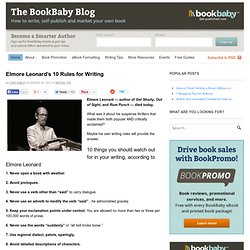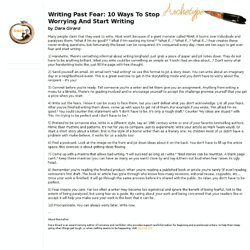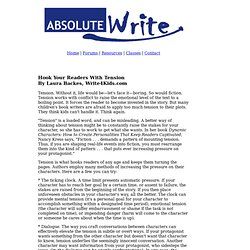

How to Write a Book In Your Spare Time. Many people say they would like to write a book.

That statement is usually in the form of “I have this great book idea”, “I’ve always wanted to write a novel” or “I will write it when I have more time.” I used to say things like that. I kept promising myself that I would write a book someday. Then I realized something important. There are seven days in a week, but someday isn’t one of them. Do It Now I’ve had several friends who have told me they want to write a novel. The best advice I ever got from another writer was this: put your butt in the chair. Stephen King said, “The scariest moment is just before you start.” Making yourself sit down and start typing is something I fight with daily, even after having written two full-length novels. Just put your butt in the chair and start working. Finding Time The most common excuse I hear is “I don’t have time.”
I wrote my first two novels by finding fifteen minutes, three times each day. In the morning, I woke up fifteen minutes early. Go img. Elmore Leonard's 10 Rules for Writing. Elmore Leonard — author of Get Shorty, Out of Sight, and Rum Punch — died today.

What was it about his suspense thrillers that made them both popular AND critically acclaimed? Maybe his own writing rules will provide the answer. 10 things you should watch out for in your writing, according to Elmore Leonard. 10 Ways To Stop Worrying And Start Writing. By Dara Girard Many people claim that they want to write.

Most won't because of a giant monster called FEAR. It looms over individuals and paralyzes them. "What if I'm no good? " " What if I'm wasting my time? " 1) Handwrite. 2) Send yourself an email. 3) Commit before you're ready. 4) Write out the fears. 5) Pretend to be someone else. 6) Find a postcard. 7) Come up with a mantra that allows bad writing. 8) Remember you're reading the finished product. The Four Essential Stages of Writing. Image by photosteve101 In last week’s post, 7 Habits of Serious Writers, I mentioned the importance of actually writing, plus the need to redraft.

I thought it’d be worth putting those stages into context – because they’re not all you need for an effective piece. Every finished piece of writing passes through four stages: PlanningDraftingRedraftingEditing Sure, you can publish a blog post without doing any planning, or any rewriting and editing. I wouldn’t call that “finished”, myself. The four stages don’t always have to be tackled in order. But it’s crucial to be clear about what each stage involves. Stage #1: Planning Image by Dvortygirl You’re already planning your writing – whether or not you realise it. Some written pieces don’t need any more planning than that: you’ve got the idea in your head, pretty much complete.
When you’re working on a project where you already know the subject matter – an ebook, for instance, or a memoir – then it’s worth planning in some detail. Better Planning. Plot Scenario Generator. How to Write a Novel Using the Snowflake Method. General Journal Prompts - Journal Prompts. Tension. Hook Your Readers With Tension By Laura Backes, Write4Kids.com Tension.

Without it, life would be—let's face it—boring. So would fiction. Tension works with conflict to raise the emotional level of the text to a boiling point. It forces the reader to become invested in the story. "Tension" is a loaded word, and can be misleading. Tension is what hooks readers of any age and keeps them turning the pages. . * The ticking clock. . * Dialogue. . * Pacing. . * Sentence structure. Each story requires a different kind of tension. Laura Backes is the author of Best Books for Kids Who (Think They) Hate to Read from Prima/Random House. Copyright © 2002, Children's Book Insider, LLC. How to Avoid Clichés in Fantasy Writing.